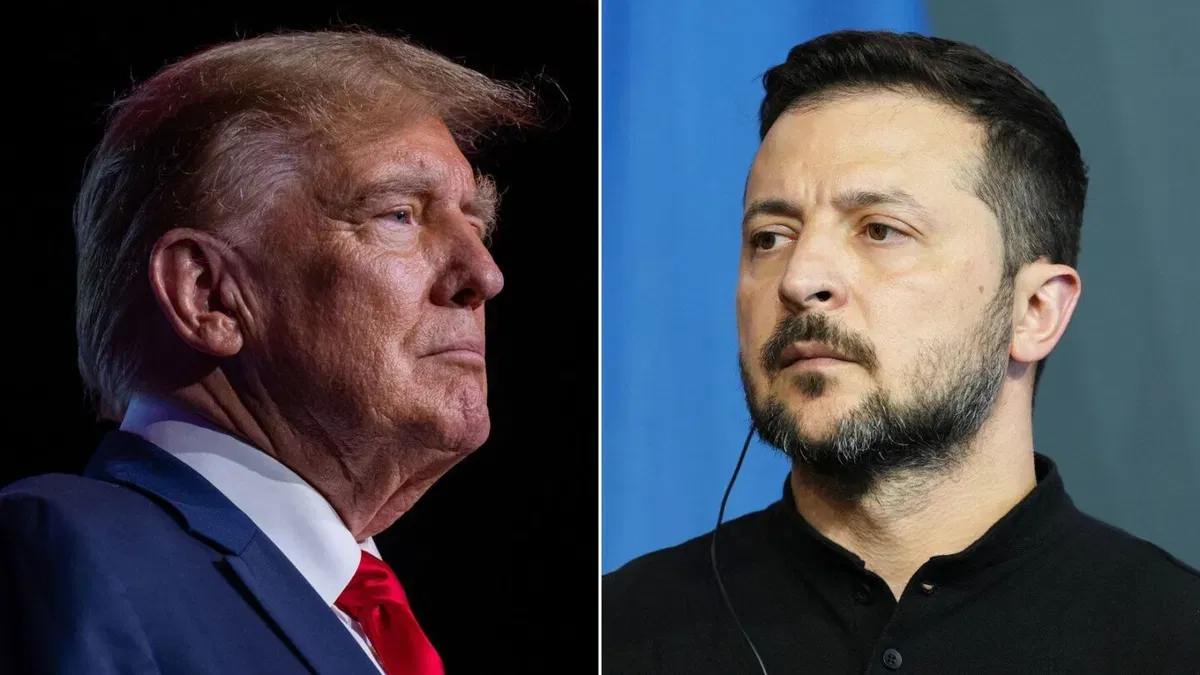Trump Criticizes Zelensky, Claims Ukrainian Leader Backs Democrats in 2024 Election
Trump accused Zelensky of leveraging his position to secure significant financial aid from the U.S. "Zelensky is the greatest salesman in history

Former President Donald Trump, campaigning for the 2024 U.S. presidential election, made a striking claim on Monday, suggesting that Ukrainian President Volodymyr Zelensky is backing the Democratic Party. Trump’s assertion, made at a rally in Pennsylvania, drew sharp distinctions between his foreign policy stance and that of his Democratic opponent, Vice President Kamala Harris.
Trump accused Zelensky of leveraging his position to secure significant financial aid from the U.S. "Zelensky is the greatest salesman in history," Trump remarked to his supporters. "Every time he comes here, he walks away with $60 billion." The former president went further, suggesting that the Ukrainian leader is rooting for the Democrats to win the 2024 election, asserting, "He wants them to win this election so badly, but I would do differently—I will work out peace."
Despite Trump’s broad statements, his peace plan for Ukraine remained vague. He reiterated his belief that only he could bring an end to the ongoing war by negotiating directly with both Zelensky and Russian President Vladimir Putin. However, no specific details were offered beyond a promise to "urge them to work out an accord" if he were to win the presidency.
In response, Harris’ campaign criticized Trump’s stance on Ukraine, pointing out his failure to express clear support for Ukraine’s victory over Russia. Morgan Finkelstein, Harris’ national security spokesperson, argued that Trump's approach would weaken U.S. influence in Europe. "If America walks away from Ukraine, Putin will be sitting in Kyiv with ambitions for the rest of Europe and our NATO allies," she warned.
Zelensky’s office in Kyiv did not immediately respond to Trump’s comments, but the Ukrainian president’s visit to the U.S. underscored the urgency of continued American support. Speaking at the United Nations General Assembly, Zelensky called for decisive action from the U.S. to help end the war as soon as next year. He also toured a weapons factory in Pennsylvania alongside Democratic Governor Josh Shapiro, a move that irritated some Trump supporters given Pennsylvania’s importance as a battleground state in the upcoming election.
The issue of U.S. support for Ukraine has become a critical talking point for both campaigns. Trump has repeatedly criticized the Biden administration's extensive financial aid to Ukraine, describing it as a misuse of American resources. In contrast, Harris has framed the conflict as a pivotal moment in global security, arguing that weakening support for Ukraine would embolden Russia and destabilize Europe.
Despite the contrasting rhetoric, Zelensky has maintained a neutral public stance on U.S. domestic politics, although he acknowledged the potential challenges of working with Trump should he return to power. In a previous interview, Zelensky referred to dealing with Trump as "hard work," but expressed hope that any future administration would continue military support for Ukraine.
The war in Ukraine, now in its second year, has taken a severe toll, with tens of thousands of lives lost and millions displaced. While Putin has conditioned any peace talks on Ukraine ceding large portions of its territory and abandoning its NATO ambitions, Zelensky has remained firm in his demands for Russia to withdraw completely and respect Ukraine’s borders as they stood after the fall of the Soviet Union.
As the U.S. election draws nearer, both campaigns are vying for the support of Eastern European American communities, particularly in states like Pennsylvania, which host significant Polish and Ukrainian populations. Trump’s remarks on Ukraine have divided voters, with some questioning whether his peace plan would undermine Ukraine’s sovereignty, while others see his approach as a pragmatic path to ending a costly and protracted war.
With the election looming, Trump continues to present himself as the candidate capable of resolving international conflicts, while Harris and her team emphasize the importance of standing by Ukraine and preserving U.S. influence in Europe. The outcome of this debate could significantly shape U.S. foreign policy in the years to come.





